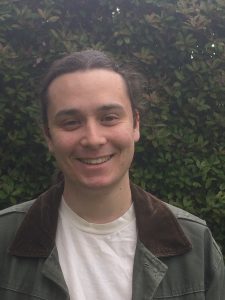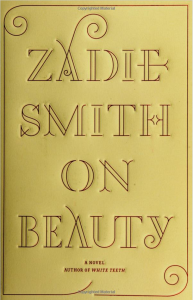By Zoe Quinton
 Max Tarlov is a senior undergraduate student in the Linguistics department at UC Santa Cruz, and the recipient of an 2020 Humanities Dean’s Award and an THI Undergraduate Research Fellowship for his research project entitled “Properties of Alignment and Match Theories in Kinyambo.” His research focuses on using intonation data from a Bantu language called Kinyambo to make predictions about how intonation can work across the world’s languages. Max also works with THI’s SPOT research cluster.
Max Tarlov is a senior undergraduate student in the Linguistics department at UC Santa Cruz, and the recipient of an 2020 Humanities Dean’s Award and an THI Undergraduate Research Fellowship for his research project entitled “Properties of Alignment and Match Theories in Kinyambo.” His research focuses on using intonation data from a Bantu language called Kinyambo to make predictions about how intonation can work across the world’s languages. Max also works with THI’s SPOT research cluster.
For THI, Zoe Quinton spoke with Max this week about the conference that sparked his research interests, his love of music and cooking, and the highlights of his time at UCSC. Max and other THI Undergraduate Fellows will be recognized at the Humanities Spring Awards on June 5, 4:00pm, on Zoom. RSVP to join us virtually for the celebration.
For those of us not versed in linguistics, can you tell us about your research project examining the Properties of Alignment and Match Theories in Kinyambo.?
The research project itself relies on three concepts. The first is Noam Chomsky’s theory of Universal Grammar, which hypothesizes that all human languages share some common grammatical mechanisms, and that variation in the world’s languages is a result of different uses of these common mechanisms.
“My project uses intonation data from a Bantu language called Kinyambo to make predictions about how intonation can work in the world’s languages.”
The second is Alan Prince and Paul Smolensky’s Optimality Theory, which provides a concrete framework for Universal Grammar that allows analysts to make testable predictions about how the world’s languages can and cannot use the grammatical mechanisms they are hypothesized to share.
The third concept is Prosody, which is a field of study in Linguistics that is concerned with, among other things, intonation of words in sentences.
My project uses intonation data from a Bantu language called Kinyambo to make predictions about how intonation can work in the world’s languages using Optimality Theory and Universal Grammar. More specifically, I compare the predictions made by two competing theories of the grammatical mechanism which connects the Prosody part of grammar to the Syntax part of grammar: Match Theory and Alignment Theory.
What drew your interest to this topic?
I work for Jennifer Bellik (post-doc/lecturer) and Professor Junko Ito as a Research Assistant on the SPOT (Syntax-Prosody in Optimality Theory) project in the Linguistics Department. They invited me to attend a meeting of the Society for Typological Analysis (enigmatically initialized as SOTA) with them in St Petersburg, Florida. The workshop was focused on making predictions about how languages can work using Optimality Theory, which they knew was closely related to my personal academic interests as well as my existing work on the SPOT project.
“My research took on a life of its own.”
At the time, I didn’t have a particular research topic in mind, so Jennifer suggested that I revisit some data she and Nick Kalivoda, another member of the SPOT team, worked with some years ago. While I had a good idea of what the goals for my project were before attending the conference in January, my research took on a life of its own once the workshop started. My travel to this conference was partially funded by the Undergraduate Research Fellowship I received from The Humanities Institute for this project.
You are a senior-year undergraduate—what have been the highlights of your time at UC Santa Cruz? How have your academic goals shifted during this time?
“In fact, my interest in linguistics was sparked by a music class which focused on developing the ability to sing in foreign languages.”
Two major highlights of my undergraduate career were participating in the conference I mentioned earlier and being a member of the SPOT research team. I was also lucky enough to be able to take some spectacular classes in the Linguistics Department that I would not have been able to take in any other undergraduate program. These classes not only exposed me to the amazing faculty and staff of the Linguistics Department and their research, but prepared me for and even inspired my own research. All of these classes were challenging in the best way possible and consistently left me in search of more knowledge. When the base of knowledge ran out for a particular question, these classes gave me the tools to try to answer it on my own.
Before developing an interest in linguistics, I was a pretty serious student of music. I sang opera and choral music and played guitar all through high school. In fact, my interest in linguistics was sparked by a music class which focused on developing the ability to sing in foreign languages that you don’t actually speak using linguistic tools.
You mention a love of music–can you tell us more about that? Any other hobbies or creative pursuits that help you to feel whole?
 I have recently been revisiting the Brahms Requiem, which I sang in high school. Maybe it is a little morbid, but it has a really hopeful and optimistic attitude towards death.
I have recently been revisiting the Brahms Requiem, which I sang in high school. Maybe it is a little morbid, but it has a really hopeful and optimistic attitude towards death.
On the lighter side, I am reading On Beauty by Zadie Smith. It has nothing to do with classical music or linguistics, but it is very entertaining.
I also love cooking. One of my favorite recipes is crispy tofu, which is achieved by dredging thoroughly dried-off tofu in cornstarch and immediately placing in a skillet with very hot oil.
Max Tarlov will be celebrated along with other THI Undergraduate Fellows at the Humanities Spring Awards on June 5, 4:00pm, on Zoom. RSVP to join us virtually for the celebration.